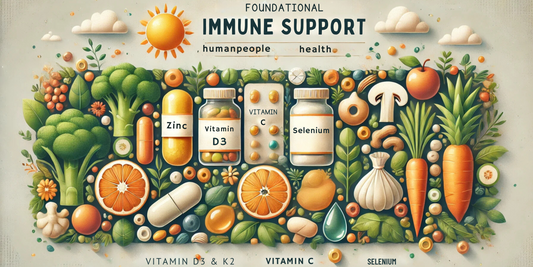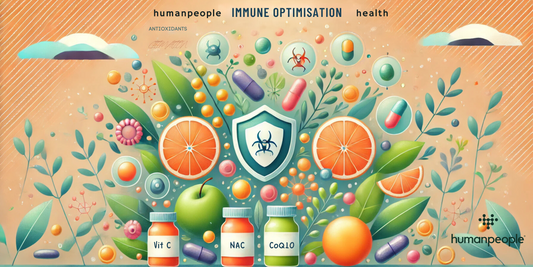Summer is truly here. Energy levels are up and we are generally feeling good. So, how can you supercharge that feel-good factor even more? And what are the best supplements to boost your energy?
Here are seven tips and biohacks to improve your energy and keep your summer on track.
1. Greet the sun (also known as light bathing)
3-5 minutes of early morning bright unfiltered light in the morning alters your hormones and neurotransmitters dramatically for the rest of your day.
If there is one hack I would strongly recommend you try for a few days it is this. Quick, free, and mood-changing. It helps reset your circadian rhythm and boost serotonin and dopamine levels.
Looking through glass doesn’t work that well because it filters too much blue light. Facing the sun outside is ideal.
In the early 2000’s Dr Provencio and his team discovered a third set of light-sensing cells in the retina, the other two being rods and cones. They do not help with image sensing and are active even in people who have lost sight. They contain a special pigment called melanopsin, particularly sensitive to blue light with peak sensitivity at 480 nanometers, aka blue light. They are called Intrinsically photosensitive retinal ganglion cells (ipRGCs). Firing these up early in the morning has a natural effect on the chemistry in the brain for the rest of the day. (1)
At sunrise/ set, sunlight has to pass through more of the Earth’s atmosphere when the sun is low in the sky. This longer path through the atmosphere scatters the shorter blue-violet light and allows the longer red wavelengths to reach your eyes hence why sunrises/ sets appear reddish.
However, within 10 minutes of sunrise (30 minutes in the Winter), the blue light intensity is strong enough to stimulate ipRGCs. Note that a car window will block 60-80% of this shortwave blue light, and regular house glass is similar.
Neuroscientists have shown that as little as a minute of this intense early morning light will significantly affect cognition. You need at least 3-5 minutes to fire these cells up, with peak effects at 15 minutes.
So, how does it work?
The drop in melatonin helps us awaken from our sleep, as melatonin is associated with feelings of sleepiness and lower core body temperature. But that’s not the only physiological event happening in the early morning.
Simultaneously, our bodies experience a surge in cortisol production, often called the “cortisol awakening response” (CAR). Cortisol, a hormone produced by the adrenal glands, plays several roles, including regulating metabolism and the body’s response to stress. Although this can occur in the dark light exposure in the morning can amplify this natural cortisol surge, leading to increased alertness and a kickstart to the day’s metabolism.
Furthermore, neurotransmitters, the brain chemicals that communicate information throughout our brain and body, also come into play. Serotonin, known as the “feel-good” neurotransmitter, is positively affected by morning light. The production of serotonin is directly related to the presence of light, with natural sunlight prompting increased production, leading to elevated mood and a sense of calm and focus throughout the day.
Dopamine, another neurotransmitter that plays a significant role in mood regulation, is also influenced by light. Exposure to bright light, such as sunlight, has increased dopamine production, improving mood and well-being.
2. Hydrate first thing in the morning
Ever notice that your urine is a darker colour in the morning? It’s because we lose 0.5-1.0 litres of fluid through sweating and moisture in our breath when we sleep. In warm temperatures, it is even higher, BUT it’s not about glugging this at once as this will trigger the kidneys. The key is to sip a couple of mouthfuls at a time. So whilst you’re spending a few minutes outside, consider hydrating at the same time.
Extra tip: add a generous pinch of pink Himalayan salt containing small amounts of other trace minerals calcium, potassium, and magnesium. The pink colour of the salt is due to these trace minerals, particularly iron oxide which imparts a pink or reddish hue. This makes it a simple, easy hack to improve hydration.
3. Keep meals light and cut the carbs
Opt for meals full of fruits, vegetables, lean proteins, and whole grains. These will provide essential nutrients and sustained energy, without weighing you down.
If you want to keep energy levels up and burn fat efficiently, acetyl L carnitine and creatine are two interesting products. The former is made from amino acids and passes the blood-brain barrier into mitochondria to increase energy production from fats.
Creatine is an essential compound made in the body from amino acids (arginine, glycine, and methionine) it is used to produce ATP, the body’s primary energy currency.
4. Move more
It’s easier to exercise when our dopamine levels are high and more enjoyable in the bright sunny weather. Use this time to build a habit. If you are exercising in the heat, be more attentive to hydration. If you sweat a lot, as I do, add electrolytes to your water. Our customers who are elite athletes also increase their magnesium intake in the summer months.
5. Be mindful of your sleep routine
Hot weather and bright evenings are the exact opposite conditions we need for sleep. To sleep well, the body needs to cool down and avoid light. Get blue light glasses and put them beside your bed if you look at your phone at night. At the recent Health Optimisation Summit, this was the most popular biohack of all.
Take non-sedating supplements: the combination of magnesium glycinate and L theanine is a winner. Read more about the importance of magnesium here.
For more info, we’ve written a separate article on how to sleep well and synchronise your sleep schedule.
6. Balance the mind
I wish I could do meditation or breathwork, but I struggle. If you can, then that is fantastic, but if not don’t beat yourself up about it – there are other ways of getting a similar result.
One of the things we are trying to do is to stop our unconscious mind from interfering with our conscious one. So if you have a hobby or passion that keeps you in the moment that is great. It’s one of the reasons why we can be restored when doing simple manual tasks. Churchill used to do bricklaying, gardening, DIY, art… find your thing.
Biohack: Rhodiola can help you maintain calm and focus if you are struggling with stress. We recommend 400 mg once a day, along with magnesium glycinate. Read more about supplements for managing stress here. Because Rhodiola is an adaptogen, the best results are taking it for 4-10 weeks and then taking a break. My advice is to use a 3:1 ratio. If you take it for nine weeks, for example, have a break of at least three weeks before pulsing it again.
7. Give yourself a break
Metaphorically and literally. Mental and physical performance is improved if you take a break.
The top seven supplements to boost energy
I thought you’d also be interested in my recommendations for the best supplements for energy
1. NMN
Nicotinamide mononucleotide (NMN). Great for energy, skin and DNA repair. NMN is a derivative of niacin, a form of vitamin B3, and is a precursor to nicotinamide adenine dinucleotide (NAD+), a crucial coenzyme found in every cell of your body. NAD+ plays a key role in cellular metabolism and energy production, facilitating the conversion of nutrients into usable energy. It drops to about 50% by middle age. Recommended dose 500mg daily.
2. Coenzyme Q10 CoQ10
This is an antioxidant that your body produces naturally. Your cells use it for growth and maintenance. CoQ10 levels decrease as you age or due to specific health conditions. It makes adenosine triphosphate (ATP), which is involved in energy transfer within cells. Recommended daily 100mg.
3. Creatine
This organic acid helps regenerate ATP, the body’s primary energy source. It’s particularly effective during high-intensity, short-duration exercises, like weightlifting. It helps with muscle growth. 20g loading for a week then 5g per day. It is essential for mitochondrial health. This is not a supplement humanpeople provide but it is inexpensive and worth considering adding to your stack if you exercise a lot or suffer from fatigue.
4. B vitamins
This group of vitamins plays a crucial role in cellular metabolism, converting the food you eat into usable energy. They also help with red blood cell formation, which delivers oxygen to your cells. Although the UK population is well known to be deficient in B12 (20% in those over 60) and B9 aka folate (16%), it is actually B2 that is the most common deficiency (95% in 15-18 year-olds). Taking a daily B complex is advised, but make sure it is one with the active form of B vitamins.
5. Iron
Iron is essential for making ATP. An iron deficiency can lead to anaemia, which can make you feel tired and weak because your body isn’t making enough healthy oxygen-carrying red blood cells. Optimal ferritin levels should be kept above 50 rather than the standard level of 15. Deficiency is rare in men but it is estimated 22% of women have iron intakes below the recommended dietary intake. If you are on a vegetarian diet the non-haem iron found in plants is poorly absorbed into the body so levels are worth checking.
6. Magnesium
Involved in over 300 enzymatic reactions in the body, many of which are related to energy production. It’s also needed for nerve transmission and muscle contraction. As only 1% of magnesium is found in the blood it is difficult to measure levels accurately. Up to 50% of the population is estimated to have low magnesium levels. Chelated magnesium (NOT magnesium oxide) like magnesium glycinate or citrate 1000mg per day.
7. Carnitine
The most active form is acetyl-L carnitine (ALCAR) amino acid plays a critical role in energy production and fat burning, as it transports fatty acids into the mitochondria so they can be oxidized (burned) to produce energy. Recommended strength 500mg.
My recommendations to cover the basics
- humanpeople’s Athletic and Brain supplement contains a high strength CoQ10 100mg, with all of the B vitamins in their active form including B12, B9 (folate), and B2 as well as vitamin D3 with K2 (4000 iu) and PQQ, a supplement that increases mitochondria (the power batteries in our cells).
- Combining this with NMN Pure, which helps supply the fuel, is a neat hack to improve energy production. It also helps to activate sirtuins which are well-studied longevity proteins.
- If you want to burn off fat, adding L-carnitine has also been beneficial. It also helps to lower the bad LDL cholesterol.
- If you do a lot of exercise, add creatine (not one we currently do at humanpeople). It helps build strength and muscle and also increases the resting metabolic rate. When working with athletes we recommend 20g, split into 10g morning and evening for a week then a maintenance of 5g per day. However, if you are not doing regular exercise, then it is not going to be much of a benefit. Due to the high doses needed, this is one to get in powder form rather than in capsules.
References
- 1. Altimus, C. M., Güler, A. D., Villa, K. L., McNeill, D. S., LeGates, T. A., & Hattar, S. (2008). Rods-cones and melanopsin detect light and dark to modulate sleep independent of image formation. Proceedings of the National Academy of Sciences of the United States of America, 105(50), 19998–20003






